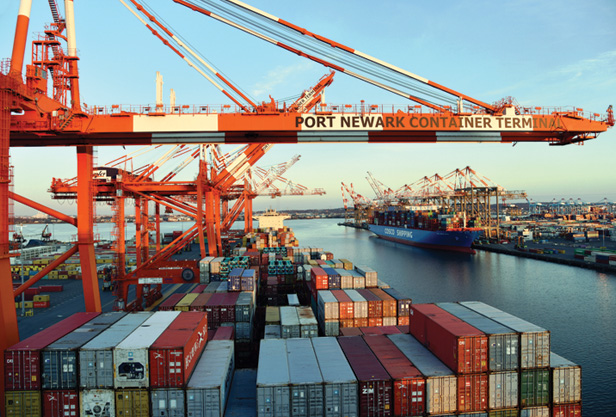News August 28, 2024
As Port Strike Looms, Suppliers Prep & Adapt
The product providers to the $26.1 billion North American merch market believe that, despite the considerable disruption that could come with a strike, their stock levels will stay strong through year’s end.
The growing threat of a potentially supply chain-hobbling strike at East and Gulf Coast ports in the United States is sparking concern and prompting adaptive action from suppliers in the promotional products industry.
The common sentiment among sourcing leaders that ASI Media spoke with is that suppliers will have strong inventory levels through the pivotal third- and fourth-quarter holiday gifting period even if there is a strike.

A container terminal at the Port of Newark in New Jersey.
Still, such a work stoppage will cause importing imbroglios, driving up the time, complexity and cost it takes to get product produced overseas landed and stocked in the United States at a moment when global supply chains are already contending with multiple disruptors. The vast majority of products sold in the North American promo market are manufactured overseas and must be brought in through ports.
“With the clock ticking and both sides not talking, the threat of a port strike impacting ports from the Canadian border to the Gulf Coast is concerning,” says John Janson, vice president of global logistics at Counselor Top 40 supplier SanMar (asi/84863).
Strike Status
The International Longshoremen’s Association (ILA), which encompasses about 85,000 unionized port workers along the East and Gulf coasts, has pledged to strike on Oct. 1 if a deal is not reached on a new contract for its members. The current contract expires Sept. 30.
Reports indicate the ILA wants a 32% pay rate increase over the life of the contract for workers, in line with a rise unionized West Coast port pros received in 2022 at the conclusion of a contentious contract negotiation, throughout which the shadow of a strike loomed.
“We are preparing to strike at all ports from Maine to Texas if a new agreement is not reached.” Harold J. Daggett, ILA
Talks between the ILA and the U.S. Maritime Alliance – a port management organization whose members include Maersk, APM Terminals and MSC – have not gone swimmingly. The union broke off negotiations in June over what it said was job-killing automation at the Port of Mobile – a violation of the current contract, the union alleged.
Talks could resume in September, and the union appears to be gearing up for a final contract push. The ILA has called for wage scale meetings on Sept. 4 and 5. Essentially, these are meetings internal to the union in which wage scale delegates will hash out master contract demands. The leaders will also use the meetings to establish strike committees.
“We will stand strong to win a new contract that adequately compensates our hardworking and dedicated ILA longshore workforce and simultaneously are preparing to strike at all ports from Maine to Texas … if a new agreement is not reached,” said ILA President Harold J. Daggett.
Such a strike, which would reportedly shut down six of the 10 busiest ports in the United States, could be a major disruptor to stateside importing and exporting.
Denmark-based Sea-Intelligence, which studies the ocean liner industry, says a strike would result in the inability to load 20,000 TEU each day, triggering backups. A TEU (20-foot equivalent unit) is a measure of volume in units of 20-foot-long cargo containers.
“It would take six days to clear the backlog from one day of strike,” Sea-Intelligence says. Put another way, the buildup of containers from a two-week-long strike – 14 days – would take nearly three months – 84 days – to resolve.
Promo Suppliers Stay Nimble
Given such sobering figures, it’s perhaps not surprising that anxiety levels are elevating in promo supplier sourcing circles.
“We consider potential supply chain disruptions a very serious obstacle to our regular operations, especially those involving port stoppage,” says Jose Gomez, president/CEO of Counselor Top 40 supplier Edwards Garment (asi/51752).
Industry executives with their fingers on the supply chain pulse like Yuhling Lu, co-owner of Counselor Top 40 supplier Ariel Premium Supply (asi/36730), say the disruption from a strike wouldn’t be limited to East and Gulf Coast ports.
Six
The number of days it would take to clear the port backlog from one day of strike at East and Gulf Coast ports.(Sea-Intelligence)
“A strike will have a ripple effect in other areas of the supply chain,” Lu tells ASI Media. “Suppliers and other importers will reroute containers to West Coast ports. That will greatly increase the congestion there, creating delays and almost guaranteeing higher unloading and transit costs while reducing the availability of train and truck trailer carriers.”
Faced with such unwelcome consequences, some promo suppliers are taking proactive action.
Companies like Counselor Top 40 supplier Gemline (asi/56070), for instance, scheduled shipments of products to come in from overseas months earlier than normal to ensure the merchandise would be on hand and not stuck at sea.
“We pulled forward certain shipments into July and August that were originally scheduled to depart Asia in September and October,” says Tim Behling, vice president of supply chain at Gemline.
46%
Increase in the cost of a standard cargo container bound from East Asia to the North American East Coast between May 31 and Aug. 23. The stat highlights sourcing cost pressures that suppliers are facing in addition to other disruptors, like the looming port strike.(Freightos)
The Massachusetts-based firm also moved some shipments to the West Coast in advance of a potential strike-induced crunch on those ports and sourced more product from select retail brand partners that carry heavy U.S. inventories.
Elsewhere, Counselor Top 40 supplier HPG (asi/61966) “ramped up inventory in anticipation of a potential strike” – a move that, like Gemline, involved getting more product shipped to the U.S. further in advance than normal to account for possible delays from a port work stoppage, says Jing Rong, vice president of supply chain and sustainability.
Meanwhile, Edwards Garment has been coordinating with sourcing partners to execute the best approach.
“We have not decided to reroute our containers at this time but have been in close communication with our freight forwarders to plan for the use of alternate options in case of delays,” says Gomez. “We have safety stocks in place, and the diversity of our sourcing base provides multiple other entry points for our products.”
Eyes on Industry Inventory
Stock levels are of primary concern to promo distributors. During the COVID-era supply chain crisis, port congestion and a plethora of other sourcing roadblocks led to inventory shortages at suppliers that complicated and frustrated business, even leading to lost sales.
As of now, suppliers believe their stock positions will be beefy enough to meet the demands of distributors and their end-buyers through the final months of 2024, even if there is a port strike.
“We are in a great position to support our customers in Q4,” says Gemline’s Behling.
Similarly, SanMar expects to be well able to meet customers’ needs during the back half of the year, says Patrick Noonan, chief product officer at SanMar, promo’s largest supplier.
“We are in a great position to support our customers in Q4.” Tim Behling, Gemline (asi/56070)
“Overall, SanMar’s inventory is strong, and we don’t expect potential importing slowdowns on the East Coast to negatively impact our position,” Noonan says. “A large portion of our cold weather product comes in through the West Coast and, although there may be some slight delays due to increased volumes spilling over to the West Coast, we don’t anticipate material impacts to our inventory.”
Ariel Premium Supply is confident, too.
“We believe we are in a good position for the fourth quarter,” says Lu. “Thanks to our forecast models, there is enough inventory. We are insulated for a bit.”
Supply Chain Snags

The possible East/Gulf Coast port strike comes at a time when other sourcing challenges are complicating supply lines and making importing more expensive for promo suppliers.
Domestic turmoil in major apparel producer Bangladesh and cargo container shortages are among the challenges. So are soaring rates for shipping/containers, militant attacks in the Red Sea that have compelled longer/more expensive commercial shipping routes, and battles over a new contract for Canadian rail workers.
Thankfully, there was some good news for global supply lines this week: On the eve of a strike, port workers in India agreed to a new contract, averting the work stoppage.
“Without question we live in an increasingly dynamic time for supply chains around the world,” says Patrick Noonan, chief product officer at Counselor Top 40 supplier SanMar (asi/84863). “If we’ve learned anything from the past several years, it’s that you can never take your eye off your global supply chain.”
Depending on how exactly a possible strike plays out, Edwards Garment thinks there could be an impact on “servicing a portion of our customer’s needs,” says Gomez. Still, on the whole, stock will be plentiful at the Michigan-headquartered company, he states.
“We carry healthy safety stocks and have developed backup options to produce in the event that we are faced with a spike in demand or a situation outside of our control at a specific geographic location,” Gomez notes.
Says Rong: “We believe we have a strong inventory position in place and will be working closely with customers to offer alternative products if necessary.”
Ultimately, promo suppliers have no say on whether a port strike occurs. Some, however, are cautiously optimistic that a deal will be reached – or at least a major long-lasting strike averted.
“With a presidential election looming,” says Rong, “I think that, if it came to it, the federal government would step in and help negotiate at least something temporary for 2024” to help keep port operations moving.
Promo will have to keep rolling with the punches the global supply chain throws, executives say. “We are monitoring the situation at East and Gulf Coast ports closely and are confident that if a shutdown indeed does happen, we will be able to maintain a healthy supply chain,” says Paul Hirsch, CEO of Houston-based supplier HIRSCH (asi/61005). “Only time will tell.”
